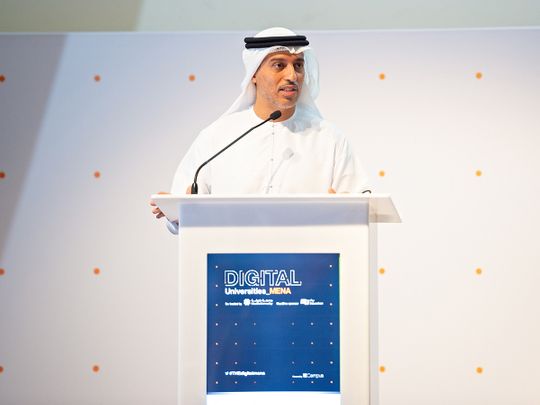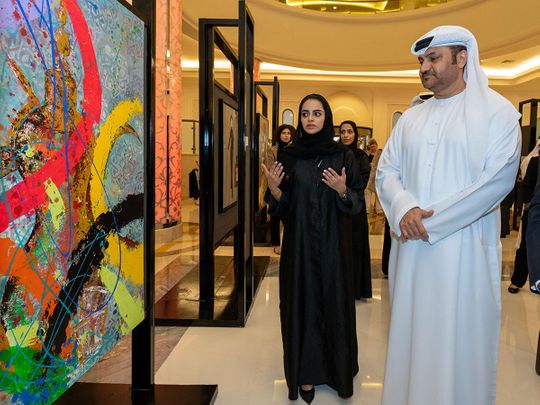Why a traditional Bachelor’s degree is no longer enough for today’s graduates

Image Credit: Supplied
Abu Dhabi: Students must keep an eye on the job market as they study for their university degrees, even taking up additional courses to hone specific skills that are in demand, top educators said at an Abu Dhabi conference on Tuesday.
Without these additional skills, often offered as ‘microcredentials’, an undergraduate degree can become obsolete by the time it is completed, the experts told the Digital Universities MENA conference.
Increasingly, courses can be accessed digitally at the students’ convenience, and universities in the UAE are looking at ways to offer high quality digital education to students.
Ahmed Belhoul Al Falasi, Minister of Education, said: “We at the [Ministry of Education] are looking for ways in which we can allow for digital education across the UAE. We had a lot of push-back from a lot of institutions [about implementing even small amounts of digital education], but then COVID-19 came and it was 100 per cent [digital education]. That push really made everyone more open to digital education, including regulators, students and faculty. Coming out of COVID-19, we have a real opportunity to look back and say, ‘We were fully conservative and we were forced to go fully digital. What is the right [mix]?”
Adding that the definition of digital universities is still evolving, he said that the UAE has long had the infrastructure in place to support and roll out quality digital education.
“In the UAE, we [have] had [smart education] initiatives that had been in place for a really long time. The Mohammed Bin Rashid Programme for Smart Education really built the infrastructure [for digital education] with the telecom companies, and applications have been developed that enable access to digital education for all,” Al Falasi said.
Pursue microcredentials
Speaking at the two-day conference, top educators urged students to obtain microcredentials – shorter courses that focus on specific skills that are in demand. For example, a business major can choose to learn enterprise software like SAP that is widely used to manage business operations and customer relations, Hussain Selim, director of the Centre for Excellence in Teaching and Learning at the UAE University, told Gulf News on the sidelines of the conference.
“A traditional Bachelor’s degree is no longer sufficient to ensure employment, and this is an alarm that reminds us to augment these programmes with timely skills [that are demanded in the marketplace]. Otherwise, degrees may well be obsolete by the time your graduate,” Selim.
Employer demands
Students must therefore keep a close eye on what potential employers are looking for, and develop those key skills while pursuing their graduate and undergraduate degrees. “My advice would be to concentrate every single day on what employers need, and to ‘retool’ yourself with microcredentials,” the educator advised.
Microcredentials are currently offered by a variety of training institutes in the UAE, and experts said traditional universities could soon expand their offerings to include them as well. According to Selim, the UAE University has already offered a series of accredited microcredentials in collaboration with the Ministry of Education and Al Ghurair Foundation.
Rethink degrees
He added that universities must also rethink whether their degree programmes are sufficient for students to find employment. “There has, so far, been a cultural focus on the UAE on ensuing that students have traditional Bachelors degrees. But maybe it is now time to accept MicroBachelors, MicroMasters and Microcredentials,” Selim said.
The conference was organised by edX, an American open online course provider created by Harvard and MIT. John Schwartz, head of global business development at edX, discussed the future of higher education, saying that future degree programmes should be tailored for students who are digital natives, and who prefer blended learning to pure face-to-face learning.
The platform offers numerous courses and MicroMasters from top international universities.
“Technology [to provide buildable, asynchronous, digital learning] is not lagging behind, but the challenge lies in how academic will incorporate these credentials,” Schwartz said, urging regulators and universities to accept digital skills pursued by students.
“The students we are teaching are digital natives, and they like digital learning. When they are not in the classroom, they are on social media, so we must take this preference into account when designing our offerings,” he added.
Responsive students
Dr Arif Al Hammadi, executive vice president at Khalifa University of Science and Technology, said students in the UAE have long responded to market needs.
“Students in the UAE have been reactive to the needs of the job market so far, beginning with pursuing business programmes in the 1990s to communications degrees in the 1980s, and IT degrees, enterprise systems, and aerospace in the 1990s. Recently, students were gravitating towards nuclear energy degrees with the launch of the UAE’s peaceful Barakah Nuclear Power Plant, and there is now a focus on studying space and artificial intelligence,” he said.
The conference will continue to discuss future learning and education trends, including the form and nature of the modern classroom.


